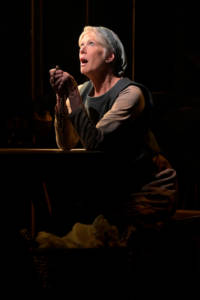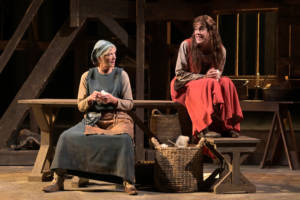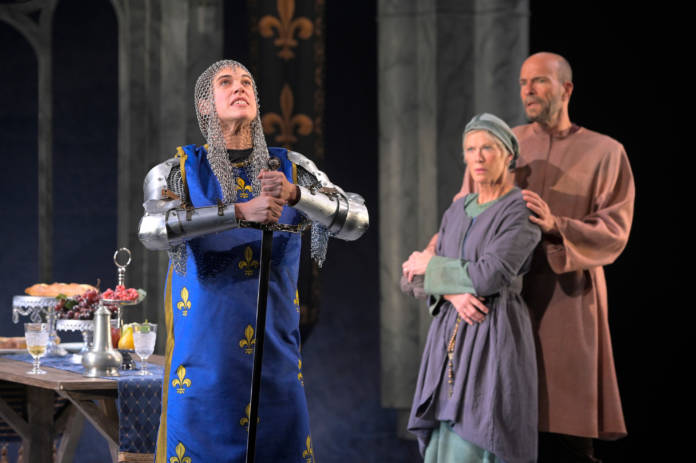Jane Anderson wrote her play Mother of the Maid about Joan of Arc’s mother, Isabelle Arc, as a tribute to her own mother. When she had a child herself, Anderson realized she must have been difficult to raise. Her mother, she says, was both proud of her and deeply embarrassed.
“I was a gay girl in the ’70s and ’80s, which was unspeakable back then,” she said in an interview with 48 Hills. “I was artistically talented, so to speak, and she took great pride in that and she also worried for me and wanted me hidden away. In the play, I gave Isabelle these lines to says to the Lady of the Court; ‘Women in my village think I’ve raised a strange daughter.’”
Anderson describes the beginning of the play, where Joan tells her mother about her visions of Saint Catherine, as very personal.
“It’s this whole confession of having visitations and what Saint Catherine does to her,” Anderson said. “In essence, it’s a coming out scene.”
Anderson was talking while driving down Highway 5 from her home in Marin to Los Angeles. Glenn Close had the title role in Mother of the Maid in New York, and Close also starred in Anderson’s adaptation of The Wife. Mother of the Maid’s West Coast premiere is at Marin Theatre Company, where it has already been extended to run through December 15.
Over her 30 years as a playwright and screenwriter, Anderson’s work includes an Emmy for her adaption of Elizabeth Strout’s Olive Kitteridge for HBO, and screenplays for many movies, including How to Make An American Quilt, and The Prizewinner of Defiance, Ohio, which she also directed.

Anderson was obsessed with Joan of Arc as a child. She liked the idea of a girl dressing in men’s clothes, leaving town and going off to do great and ambitious things. As an adult and mom, Anderson started to see how strong Isabelle, Joan’s mother, must have been.
“Any mother who loves their child dearly and is both ambitious for her child and fearful for the child, fearful of what the world might do to her, has nerves of steel,” she said. “She was a peasant woman who was illiterate and barely left her small town, but she had seen horrible things—the death of her babies and English soldiers coming in and slaughtering her best friend and her family. Those people in that time may appear to be simple, but they had to deal with earth-shaking things and they had to be very strong to keep their sanity.”
Anderson said she did a lot of research about Joan of Arc, but her intention was not to write a historical play, but rather a sort of metaphor about mothers and daughters. She encouraged the actors in the play to discard their assumptions about Joan of Arc being saintly and grand. She must have had a certain arrogance to do what she did, Anderson thinks.
“I’m sure it must have been true of any young person who has the balls and the moxie to just walk up to important people and say, ‘I’m going to save France,’” Anderson said. “We know that people of 18 or 19 or in early 20s, there’s both an extreme callousness and extreme boldness. You think you know everything.”

In 1429, Joan of Arc was with the French forces who broke the siege at Orléans. A couple months later, she traveled to the coronation of King Charles VII. The next year she was captured and tried for heresy and burnt at the stake in Rouen.
Twenty-five years after her daughter’s death in 1455, Isabelle of Arc traveled to an inquest to clear Joan’s name. The following year her condemnation was nullified. When Anderson did her research, she was particularly struck by Isabelle traveling to testify for her daughter.
“She began her testimony by saying, ‘I had a daughter once,’ and that killed me,” Anderson said. “So I ended the play like that.”
MOTHER OF THE MAID
Through December 15
Marin Theatre Company, Mill Valley
Tickets and more information here.







